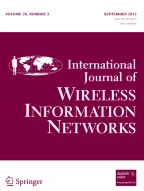Abstract
With the 802.11 WLAN multimedia applications (Video, Audio, real-time voice over IP,…) increasing, providing Quality of Service (QoS) support becomes very important since the original standard doesn’t take QoS into account. The standard offers access to the wireless users only regarding physical considerations. This can lead to overloaded access points (AP) and considerable degradation of the QoS. This paper deals with this problem. It focuses on the presentation of a QoS management solution for wireless communication systems. It mainly defends that a balanced distribution of mobile stations among the available access points leads to better performances of the Wireless LAN. Some OPNET simulations of the proposed approach are presented to show a better resources allocation and efficiency on QoS metrics. A protocol structure between mobiles and APs is also specified for the implementation of this approach. An SDL description and MSC simulation of this protocol is provided as a first step in its development.
Similar content being viewed by others
References
A. Balachandran, G. M. Voelker, P. Bahl and P. V. Rangan, Characterizing User Behavior and Network Performance in a Public Wireless LAN. ACM SIGMETRICS Int. Conference on Measurement and Modelling of Computer Systems. Marina Del Rey, California, 2002.
A. Balachandran, G. M. Voelker, and P. Bahl, Hot Spot Congestion Relief in Public-Area Wireless Networks. 4th Workshop on Mobile Computing Systems and Applications, Callicoon, New York, USA, 2002 70–80.
IEEE 802.11 - Part 11: Wireless Medium Access Control (MAC) and Physical Layer (PHY) specifications: Medium Access Control (MAC) Enhancements for Quality of Service (QoS), IEEE 802.11e/Draft 4.2, 2003.
R. L. Probert, H. Ural, and A. W. Williams, Rapid generation of functional tests using MSCs, SDL and TTCN, Computer Communications, Vol. 24, No. (3–4), pp. 374–393, 2001.
Q. Ni, L. Romdhani, and T. Tureletti, A Survey of QoS Enhancements for IEEE 802.11 Wireless LAN, Journal of Wireless Communications and Mobile Computing, Vol. 4, No. 5, pp. 547–566, 2004.
A. Lindgren, A. Almquist, and O. Schelen Quality of service schemes for IEEE 802.11 wireless LANs – an evaluation, Mobile Networks and Applications, Vol. 8, No. 3, pp. 223–235, 2003.
S. Mangold, S. Choi, G. R. Hiertz, O. Klein, and B. Walke, Analysis of IEEE 802.11e for QoS support in wireless LANs, IEEE Wireless Communications, Vol. 10, No. 6, pp. 40–50, 2003.
H. Zhu, M. Li, I. Chlamtak, and B. Prabhakaran, A survey of Quality of Service in IEEE 802.11 Networks. IEEE Wireless Communications, Vol. 11, No. 4, pp. 6–14, 2004.
W. Pattara-Atikom, P. Krishnamurthy, and S. Banerjee, Distributed mechanisms for quality of service in Wireless LAN, IEEE Wireless Communications, Vol. 10, pp. 26–34, 2003.
Y. Xiao, Performance analysis of priority schemes for IEEE 802.11 and IEEE 802.11e wireless LANs. IEEE Transactions on Wireless Communications, Vol. 5, No. 4, pp. 1506–1515, 2005.
S. T. Sheu and C.C. Wu, Dynamic Load Balance Algorithm (DLBA) for IEEE 802.11 wireless LAN. Tamkang Journal of Science and Engineering, Vol. 2, No. 1, pp. 45–52, 1999.
G. Bianchi and I. Tinnirello, Improving Load Balancing Mechanisms in Wireless Packet Networks. IEEE International Conference on Communications, New York, USA, pp. 891–895, 2002.
H. Velayos, V. Aleo, and G. Karlsson, Load Balancing in Overlapping Wireless Cells. IEEE International Conference on Communications, Paris, France, 2004.
O. Brickley, S. Rea and D. Pesch, Load balancing for QoS enhancement in IEEE802.11e WLANs using cell breathing techniques. 7 ème IFIP International Conference on Mobile and Wireless Communications Networks, Maroc, 2005.
D. Zhao, J. Zou, and T. D. Todd, Admission control with load balancing in IEEE 802.11-based ESS mesh networks, Wireless Networks, Vol. 13, pp. 351–359, 2007.
C. R. Lin, and M. Gerla, Real time support in multihop wireless networks, ACM Wireless Networks, Vol. 5, No. 2. pp. 125–135, 1989.
J. R. Gallardo, P. Medina, and W. Zhuang, QoS Mechanisms for the MAC protocol of 802.11 WLANs, Wireless Networks, Vol. 13, pp. 335–349, 2007.
F. Cali, M. Conti, and E. Gregori, Dynamic IEEE 802.11: design, modeling and performance evaluation, IEEE Journal of Selected Areas in Communications, Vol. 18, No. 9, pp. 1774–1786, 2000.
S. G. Matthew, 802.11 Wireless Networks: The Definitive Guide, 1st ed. O’Reilly and associates Inc, 2002.
I. Jabri, N. Kromenacker, A. Soudani, and T. Divoux, Load Balancing Approach for wireless IEEE 802.11 QoS Enhancement, Personal Wireless Communications, Lecture Notes in Computer Science, ISBN 978-3-540-45174-7, pp. 88–99, 2006.
D.-M. Chiu and R. Jain, Analysis of the increase and decrease algorithms for congestion avoidance in computer networks, Journal of Computer Networks and ISDN, Vol. 17, No. 1, pp. 1–14, 1989.
R. Gotzhein and P. Schaible, Pattern-based Development of Communication Systems, Annales Télecommunication, No. 54, 1999.
Acknowledgement
This work has been performed with the finance support of the CMCU project: an integrated action between Tunisian and French research Ministries. This project aims the study of QoS management in distributed systems.
Author information
Authors and Affiliations
Corresponding author
Rights and permissions
About this article
Cite this article
Jabri, I., Krommenacker, N., Divoux, T. et al. IEEE 802.11 Load Balancing: An Approach for QoS Enhancement. Int J Wireless Inf Networks 15, 16–30 (2008). https://doi.org/10.1007/s10776-008-0072-y
Received:
Accepted:
Published:
Issue Date:
DOI: https://doi.org/10.1007/s10776-008-0072-y
